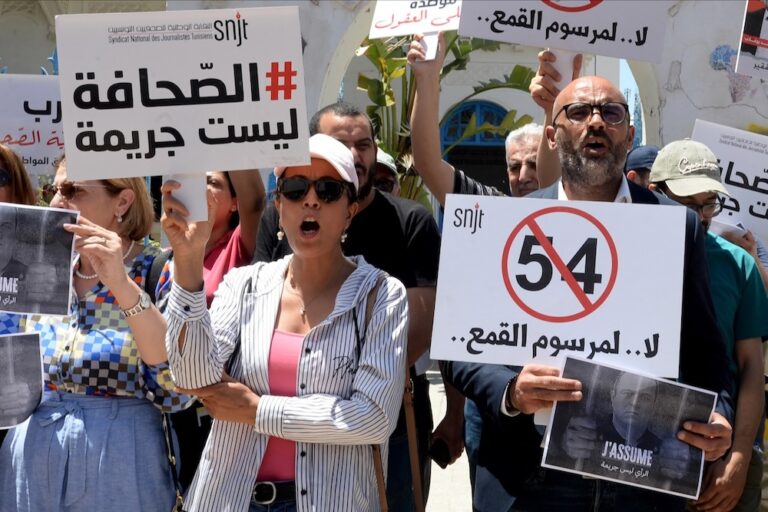(HRinfo/IFEX) – The following is a 23 March 2006 Hrinfo press release: HRinfo Press Freedom Support Unit Press Observatory On 21 March 2006, the Arabic Network for Human Rights Information (HRinfo) set up a Press Observatory to monitor the Arabic language press in Egypt, searching for what appear to be paid advertisements (disguised as articles) […]
(HRinfo/IFEX) – The following is a 23 March 2006 Hrinfo press release:
HRinfo Press Freedom Support Unit Press Observatory
On 21 March 2006, the Arabic Network for Human Rights Information (HRinfo) set up a Press Observatory to monitor the Arabic language press in Egypt, searching for what appear to be paid advertisements (disguised as articles) praising governments that are infamous for their gross violations of human rights. HRinfo is currently targeting newspapers which accept paid advertisements from the Tunisian government.
When a newspaper publishes one of these paid advertisements, HRinfo sends a standard letter addressed to the editor-in-chief, bringing their attention to the violations taking place in the country concerned and requesting that the newspaper dedicate a space to publishing information on such violations.
The Press Observatory is a new activity within HRinfo’s Press Freedom Support Unit, which has been a part of HRinfo’s core activities since its establishment in 2003.
In commemoration of the 50th anniversary of Tunisian independence, HRinfo saw fit to start monitoring Egyptian press coverage of Tunisia. HRInfo belongs to the 15-member IFEX Tunisia Monitoring Group (TMG). HRinfo sent letters to “Al-Ahram” newspaper, “Al-Usbuu” newspaper, “Rozal Youssef” magazine, and “Al-Akhbar” newspaper.
“Al-Ahram” published an article on 20 March 2006 entitled “In commemoration of the 50th anniversary of Tunisia’s independence: Ben Ali’s reforms and accomplishments consolidated civil and political liberties.”
“Al-Usbuu” published an article on 20 March 2006 entitled “Fifty years since Tunisia’s independence: pluralism, law state, freedom of expression, and good foundations for reform and development.”
“Rozal Youssef” published an article on 18 March 2006 entitled “Freedom of expression, fostering human rights principles and actual political participation: the pillars of the Tunisian democratic society.”
“Al-Akhbar” published an article on 21 March 2006 entitled “In his speech commemorating the 50th anniversary of Tunisia’s independence: Bin Aly calls upon the quartet group to continue their efforts for a just peace and proceed on the route of democracy and societal solidarity.”
In all four cases, HRinfo drafted a standard letter, modified according to the publication. The following is a translation of the letter sent to “Al-Usbuu” on 21 March 2006:
“For the attention of: Mustafa Bakry, Editor in Chief and Board Chairman of “Al-Usbuu” Newspaper,
We have read in “Al-Usbuu” newspaper, issued yesterday, an article published on page 25 entitled “Fifty years since Tunisia’s independence: pluralism, law state, freedom of expression, and good foundations for reform and development.”
Since I work for the Arabic Network for Human Rights Information (HRinfo), we know and have many documents posted on our website, issued by Tunisian civil society organizations and other international and regional organisations, which express a different opinion to that of the Tunisian government which paid for the advertisement published in your respectable newspaper.
Freedom of expression and press, which we all call for, requires the putting forth of different viewpoints regarding the same issue. Tunisian civil society organisations and defenders of freedom of expression and other civil and political rights disclose to the Egyptian, Arab, and international public the deterioration and violations of human rights committed by the Tunisian government.
Accordingly, we request you make room in “Al-Usbuu” newspaper to publish some of the issues and concerns of Tunisian activists working in civil society organisations and defending freedom of expression.
It would be our pleasure to provide you with the publications that express a viewpoint that differs that which has been announced by the Tunisian government. You can also read the special section on Tunisia on our website: http://www.hrinfo.net/tunisia
We thank you in advance for your positive response and we look forward to further cooperation in issues pertaining to freedom of expression.
Best regards,
Gamal Eid
Executive Director
Arabic Network for Human Rights Information (HRinfo)


